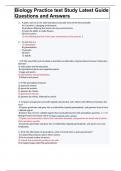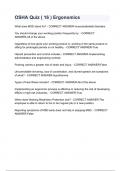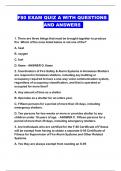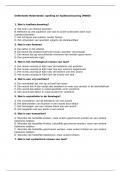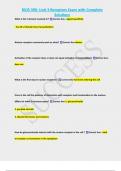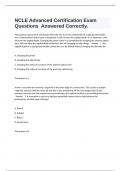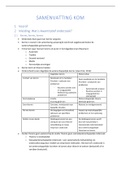College 4 29-09-2021
Memory (encoding, storage, retrieval)
McDermott & Roediger
- ‘memory’ is a single term that reflects a number of different abilities: holding
information briefly while working with it (working memory), remembering episodes
of one’s life (episodic memory), and our general knowledge of facts of the world
(semantic memory), among other types.
- Working memory – short-term memory; the ability to hold information in our minds
for a brief time and work with it (eg multiplying 24x17 without using paper)
- Episodic memory – the ability to remember the episodes of our lives (mentally travel
though the day/year/etc in your mind and note some/the main events)
- Semantic memory – storehouse of more-or-less permanent knowledge (the meanings
of words in a language and the huge collection of facts about the world (206 bones in a
body))
- Collective memory – the kind of memory that people in a group share (family,
community, schoolmates, citizens of state or country)
- 3 stages in process of learning and remembering (affect one another, and are
inextricably bound together)
o Encoding
The initial learning of information
The initial experience of perceiving and learning information
It is selective we attend to some events in our environment and we
ignore others
It is prolific we are always encoding the events of our lives
(attending to the world, trying to understand it)
Distinctiveness – having an event stand out as quite different from a
background of similar events – as a key to remembering events (giraffe
on campus)
Flashbulb memory – vivid memory of finding out an important piece of
news (being able to recall their exact physical location when they first
learned about the assassination or accidental death of a national figure)
Objective accuracy with them is far from perfect
Recoding taking the information from the form it is delivered to us
and then converting it in a way that we can make sense of it
Pragmatic conclusions/inferences (1 particular inference you’re likely
to make)
Unless an event is encoded in some fashion, it will not be successfully
remembered later. However, just because an event is encoded (even it
is encoded well), there’s no guarantee that it will be remembered later!
o Storage
Maintaining information over time
Experiences leave memory traces or engrams (synonyms)
Events (occurrences in our environment) create engrams through a
process of consolidation – the neural changes that occur after learning
to create the memory trace of an experience
, Memory trace – the physical change in the nervous system (whatever
that may be, exactly) that represents our experience
Memory is a construction of what you actually recall and what you
believe happened
Remembering is reconstructive (we reconstruct our past with the aid of
memory traces) not reproductive (a perfect reproduction or recreation
of the past)
Retention interval – the time between learning and testing
Retroactive interference – refers to new activities (ie the subsequent
lunches) during the retention interval (the time between the lunch 17
days ago and now) that interfere with retrieving the specific, older
memory (the lunch details from 17 days ago)
One of the main causes of forgetting
Proactive interference – when past memories interfere with the
encoding of new ones (study 2nd language grammar and vocabulary
of native language will pop into your head)
Misinformation effect – memory for an event can be changed via
misinformation supplied during the retention interval
! Although interference may arise between the occurrence of an event
and the attempt to recall it, the effect itself is always expressed when
we retrieve memories !
o Retrieval
Ability to access information when you need it
Available information – information that is stored in memory – but
precisely how much and what types are stored cannot be known
Accessible information – information that we can retrieve
Type of hints or cues in the environment determines what information
can be retrieved from memory
Encoding specificity principle – when people encode information, they
do so in specific ways (is general principle that underlies the
effectiveness of retrieval cues) to the extent a retrieval cue (the
song) matches or overlaps the memory trace of an experience (the
party, the conversation), it will be effective in evoking the memory
Cue overload principle – to be effective, a retrieval cue cannot be
overloaded with too many memories
Recall can sometimes lead to better performance than recognition –
encoding specificity principle recognition failure of recallable words
(a cue will be most effective depending on how the information has
been encoded)
Testing effect/retrieval practice effect the act of retrieval itself (of a
fact, concept, or event) makes the retrieved memory much more likely
to be retrieved again
Retrieval-induced forgetting retrieving some information can
actually cause us to forget other information related to it
o 2 types of error forgetting and misremembering (possible by just hearing a
vivid story, or just misremembering)
,- Strategies that can be used to enhance the original learning or encoding of information
- Strategies that can improve the process of retrieval
o For a retrieval cue to be effective, a match must exist between the cue and the
desired target memory
o To produce the best retrieval, the cue-target relationship should be distinctive
o So to maximize retrieval, we should construct meaningful cues that remind us
of the original experience, and those cues should be distinctive and not
associated with other memories
- Why classic mnemonic device, the method of loci, works well
o Mnemonic device – a strategy for remembering large amounts of information,
usually involving imaging events occurring on a journey or with some other set
of memorized cues
o Peg word technique have a set of peg words on which you could ‘hang’
memories
o Method of loci/memory palaces using elaborate scenes with discrete places;
mentally walking through the home where you grew up and identifying as
many distinct areas and objects as possible
- To remember well you need to encode information in a distinctive way and to have
good cues for retrieval
, Levels of processing: the evolution of a framework
Ekuni, Vaz, and Amodeo Bueno
- Introduction
o Assume idea that memory consists of 3 main stages: encoding (acquisition of
information), storage (maintenance of the information) and retrieval (use of the
information that was stored)
o LOP – levels of processing
o Craik (2002) proposed that semantic analysis, ie more ‘deep processing’, is
associated with higher levels of retention and long-term memory traces
o Shallow processing subject answered questions concerning the word’s
typeface (is the word … written in capital letters?)
o Intermediate processing subject answered questions about rhyme (does the
word … rhyme with …?)
o Deep processing subject answered questions directed toward the word’s
semantic content (does the word … fit into this sentence: …?)
o Compatibility – ‘pen is an object used to write?’ yes – target words be more
elaborated and better recalled than with incompatible questions
o Transfer-appropriate processing
o Encoding specificity principle
o Robust encoding (to explain that a more deeply encoded trait becomes
accessible to more cues at the time of recall)
o Tulving (2001) – memory is not simply a reconstruction in which the subject
picks up pieces of a mind puzzle and reconstructs the recollection; rather, it is
pure construction, in which the subject must rebuild the episode, which is why
the memory is so prone to error
- Neuroimage of LOP
o Activity in the prefrontal cortex and the medial temporal region is associated
with deeper levels of processing and better performance on memory tests
Memory (encoding, storage, retrieval)
McDermott & Roediger
- ‘memory’ is a single term that reflects a number of different abilities: holding
information briefly while working with it (working memory), remembering episodes
of one’s life (episodic memory), and our general knowledge of facts of the world
(semantic memory), among other types.
- Working memory – short-term memory; the ability to hold information in our minds
for a brief time and work with it (eg multiplying 24x17 without using paper)
- Episodic memory – the ability to remember the episodes of our lives (mentally travel
though the day/year/etc in your mind and note some/the main events)
- Semantic memory – storehouse of more-or-less permanent knowledge (the meanings
of words in a language and the huge collection of facts about the world (206 bones in a
body))
- Collective memory – the kind of memory that people in a group share (family,
community, schoolmates, citizens of state or country)
- 3 stages in process of learning and remembering (affect one another, and are
inextricably bound together)
o Encoding
The initial learning of information
The initial experience of perceiving and learning information
It is selective we attend to some events in our environment and we
ignore others
It is prolific we are always encoding the events of our lives
(attending to the world, trying to understand it)
Distinctiveness – having an event stand out as quite different from a
background of similar events – as a key to remembering events (giraffe
on campus)
Flashbulb memory – vivid memory of finding out an important piece of
news (being able to recall their exact physical location when they first
learned about the assassination or accidental death of a national figure)
Objective accuracy with them is far from perfect
Recoding taking the information from the form it is delivered to us
and then converting it in a way that we can make sense of it
Pragmatic conclusions/inferences (1 particular inference you’re likely
to make)
Unless an event is encoded in some fashion, it will not be successfully
remembered later. However, just because an event is encoded (even it
is encoded well), there’s no guarantee that it will be remembered later!
o Storage
Maintaining information over time
Experiences leave memory traces or engrams (synonyms)
Events (occurrences in our environment) create engrams through a
process of consolidation – the neural changes that occur after learning
to create the memory trace of an experience
, Memory trace – the physical change in the nervous system (whatever
that may be, exactly) that represents our experience
Memory is a construction of what you actually recall and what you
believe happened
Remembering is reconstructive (we reconstruct our past with the aid of
memory traces) not reproductive (a perfect reproduction or recreation
of the past)
Retention interval – the time between learning and testing
Retroactive interference – refers to new activities (ie the subsequent
lunches) during the retention interval (the time between the lunch 17
days ago and now) that interfere with retrieving the specific, older
memory (the lunch details from 17 days ago)
One of the main causes of forgetting
Proactive interference – when past memories interfere with the
encoding of new ones (study 2nd language grammar and vocabulary
of native language will pop into your head)
Misinformation effect – memory for an event can be changed via
misinformation supplied during the retention interval
! Although interference may arise between the occurrence of an event
and the attempt to recall it, the effect itself is always expressed when
we retrieve memories !
o Retrieval
Ability to access information when you need it
Available information – information that is stored in memory – but
precisely how much and what types are stored cannot be known
Accessible information – information that we can retrieve
Type of hints or cues in the environment determines what information
can be retrieved from memory
Encoding specificity principle – when people encode information, they
do so in specific ways (is general principle that underlies the
effectiveness of retrieval cues) to the extent a retrieval cue (the
song) matches or overlaps the memory trace of an experience (the
party, the conversation), it will be effective in evoking the memory
Cue overload principle – to be effective, a retrieval cue cannot be
overloaded with too many memories
Recall can sometimes lead to better performance than recognition –
encoding specificity principle recognition failure of recallable words
(a cue will be most effective depending on how the information has
been encoded)
Testing effect/retrieval practice effect the act of retrieval itself (of a
fact, concept, or event) makes the retrieved memory much more likely
to be retrieved again
Retrieval-induced forgetting retrieving some information can
actually cause us to forget other information related to it
o 2 types of error forgetting and misremembering (possible by just hearing a
vivid story, or just misremembering)
,- Strategies that can be used to enhance the original learning or encoding of information
- Strategies that can improve the process of retrieval
o For a retrieval cue to be effective, a match must exist between the cue and the
desired target memory
o To produce the best retrieval, the cue-target relationship should be distinctive
o So to maximize retrieval, we should construct meaningful cues that remind us
of the original experience, and those cues should be distinctive and not
associated with other memories
- Why classic mnemonic device, the method of loci, works well
o Mnemonic device – a strategy for remembering large amounts of information,
usually involving imaging events occurring on a journey or with some other set
of memorized cues
o Peg word technique have a set of peg words on which you could ‘hang’
memories
o Method of loci/memory palaces using elaborate scenes with discrete places;
mentally walking through the home where you grew up and identifying as
many distinct areas and objects as possible
- To remember well you need to encode information in a distinctive way and to have
good cues for retrieval
, Levels of processing: the evolution of a framework
Ekuni, Vaz, and Amodeo Bueno
- Introduction
o Assume idea that memory consists of 3 main stages: encoding (acquisition of
information), storage (maintenance of the information) and retrieval (use of the
information that was stored)
o LOP – levels of processing
o Craik (2002) proposed that semantic analysis, ie more ‘deep processing’, is
associated with higher levels of retention and long-term memory traces
o Shallow processing subject answered questions concerning the word’s
typeface (is the word … written in capital letters?)
o Intermediate processing subject answered questions about rhyme (does the
word … rhyme with …?)
o Deep processing subject answered questions directed toward the word’s
semantic content (does the word … fit into this sentence: …?)
o Compatibility – ‘pen is an object used to write?’ yes – target words be more
elaborated and better recalled than with incompatible questions
o Transfer-appropriate processing
o Encoding specificity principle
o Robust encoding (to explain that a more deeply encoded trait becomes
accessible to more cues at the time of recall)
o Tulving (2001) – memory is not simply a reconstruction in which the subject
picks up pieces of a mind puzzle and reconstructs the recollection; rather, it is
pure construction, in which the subject must rebuild the episode, which is why
the memory is so prone to error
- Neuroimage of LOP
o Activity in the prefrontal cortex and the medial temporal region is associated
with deeper levels of processing and better performance on memory tests

